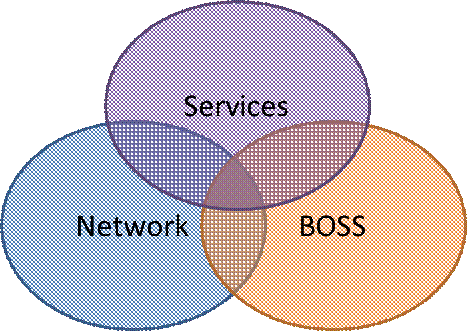
The 3 Domains: Services, Network and BOSS
Previous weblogs and The Services Domain Report have discussed that the term SDP (Service Delivery Platform) is not appropriate. We’re talking about the Services Domain, see the diagram on the left. A telco is composed of three ‘domains’ the network domain, business and operational support systems (BOSS) domain, and the services domain. The services domain is as important as the network and BOSS, yet remains under invested. Private (internal) APIs interconnect all three layers offering operational efficiencies and aiding the development of new own-branded services, as demonstrated by the leading API implementation examples of Telecom Italia, Telefonica, and increasingly Orange, T-Mobile, and Turkcell.
Telecom Italia now has a division dedicated to its “SDP and Net API”, in recognition of the revenues it generates and strategic importance reported Vincenzo Amorino of the new division. Telefonica impress me with the continuous development of its services domain, it is a leading practitioner, as evidenced by David Moro, Andreas Boose, and Martin Prosek’s excellent presentations, see slides below. Orange Poland, Sebastian Grabowski, continues to demonstrate thought leadership in using its API program to support innovation in Poland. These telcos are focused through 2014 on simplification, process improvements and supporting and developing specific business opportunities. Technology is no longer an issue, it’s all about business and operations. Telcos, please send your marketing people to this event, not only your technology people.
The event kicked off with a panel discussion between Orange, Telecom Italia and Telefonica that set the tone and identified the key issues for 2014: making the SDP (services domain) thinner; increased use of APIs internally, though some silos are OK; focus on new product development across people, process and technology; support of real-time and high through-put APIs; enterprise focus; focus on communications APIs; and NOT chasing the long-tail.
Through the conference there were also many ill-thought through discussions, for example ‘Big Data’ exposed through APIs. The external QoS (Quality of Service) API remains a staple of many vendors, but look at the fixed broadband networks, if it was possible they would have done it. Lack of clarity on public and private APIs. Identity is important but there remains a lack of clarity on strategy and understanding on the impact and importance of technologies like ISIM (IMS SIM) and TR.069. OneAPI continues to be promoted as an external API by the GSMA, its an embarrassment to the industry and demonstrates the GSMA remains detached from market reality (apologies to Manfred Bortenschlager – it’s not you I’m getting at, it’s your fat-cat bosses that are failing the industry.)
In the slides below I review some of the best presentations, which includes Manfred’s:
- David Moro, Telefonica, UNICA API Update. Focus on simplicity, making the SDP lighter, and have UNICA APIs on more network equipment to avoid the need for gateways. In the wrap-up discussion of the conference the question on whether such network equipment and BOSS APIs should be standardized was raised, with no firm conclusions given the lack of competition in supply which would limit any potential cost savings, and internal APIs are a source of competitive advantage rather than an interoperability point. The summary in David’s presentation sets out where many Telco API programs are going: cloud-based, light-weight implementations (IT-centric not Telco-centric), exposing other assets in particular identity and PCRF (Policy and Charging Rules Function) which I consider an internal API not external, and focus on new communication services like RCS (Rich Communications Suite) and WebRTC (Real-Time Communications).
- Andreas Boose, Telefonica, Re-using Existing Assets. An important innovation in using ‘Product Representations’ to support new services that can be bundled with existing offers. So Telcos can innovate with new services quickly, and wrap them into existing popular bundles for customers re-using the existing BOSS.
- Martin Prosek, Telefonica, Implementing APIs. One of the few presentations to discuss in detail what is required to implement an external API.
- Arnauld Blondet and Catalin Ciocoiu, Orange, SDP Implementation in AMEA (Africa, Middle East, and Asia). This is opening up a major opportunity for many developers focused on emerging markets. I have many intros to provide to Arnauld on the opportunity he is creating.
- Duygu Defne, Turkcell, APIs and the Enterprise. Enterprises do not buy APIs, they buy services that happen to be API enabled. Duygu gave a clear explanation of the API-enabled services they offer to the Turkish enterprise market: customer device type and phone number, free URL, nearest me and click to call. All supported by Turkcell’s enterprise sales force. This presentation was the highlight of Day 2 for me.
- Grzegorz Sikora, T-Mobile, Focused Community and Tools. Great example of taking control of service innovation from the strategic vendors, with a focused community using open source tools and platforms, including OpenCloud.
- Manfred Bortenschlager, GSMA, Developer Engagement model. The best developer engagement model I’ve seen. The problem is he has to apply an excellent process to a broken public API, OneAPI. I really feel for the challenging position Manfred is in, please someone hire him to use his model for APIs developers will actually use. We’ve discussed the problems with OneAPI and OneAPI Exchange previously in the Linkedin Telecom API group.
I left the main conference both excited and frustrated. I’m excited at the progress some telcos have made; and frustrated at the misinformation and lack of progress in many of the vendors’ marketing messages, and lack of Telco marketing involvement in the event. The analogy I’d use is the industry doesn’t need the Hollywood fantasy movie version of the war, they need the real war stories – lots of lots of case studies. These were given at the post-conference workshop, An Independent Review of Telecom API, which will be covered in a later weblog.
Thanks Alan,
for the good summary that hits the point
br
Reinhard